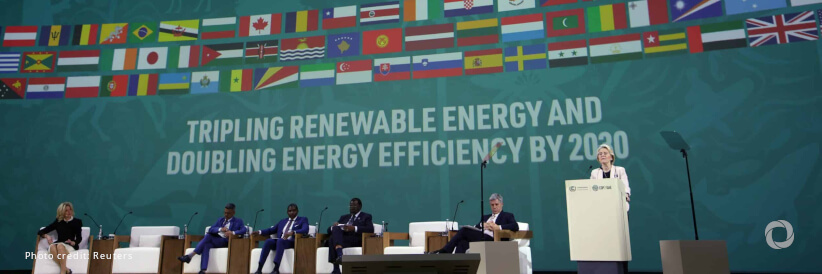At the end of the COP28 UN Climate Conference in Dubai, European Union negotiators succeeded, with partners from around the world, in keeping alive the possibility of delivering on the commitment in the Paris Agreement to limit global average temperature increase to 1.5 Celsius above pre-industrial levels.
With a particular focus on the energy sector in the talks, Parties agreed to accelerate the transition away from fossil fuels this decade, to take action to reduce emissions by 43% by 2030, and set the world on a pathway to reaching net zero emissions by 2050, in line with the best available science.
COP28 concludes the first Global Stocktake under the Paris Agreement. The goals of the Global Renewables and Energy Efficiency Pledge, championed by the Commission, have been translated into the Global Stocktake outcome. All Parties have committed to triple global renewable energy capacity and double the rate of energy efficiency improvements by 2030. This gives powerful momentum to the transition away from fossil fuels. There is also an agreement to tackle methane emissions and other non-CO2 emissions in this decade and to phase out as soon as possible inefficient fossil fuel subsidies that do not address energy poverty or the just transition.
See also: Unveiling COP28: A critical meeting to address climate change
The Global Stocktake recognizes that the world is not currently on track to reduce emissions by the necessary level to limit temperature increase to 1.5 Celsius. As a consequence, the Parties agreed on a pathway to get back on track, including a process to align national targets and measures with the Paris Agreement. Parties should submit their nationally determined contributions (NDCs) for 2035 by COP30, in two years, and these should be aligned with the best available science and the outcomes of the Global Stocktake.
The Global Stocktake also addresses the means of implementing the necessary transition. European Commission has agreed on the final steps towards setting the new collective quantified goal on climate finance at next year’s conference. The framework of the Global Goal on Adaptation is a major step, and it is accompanied by ground-breaking decisions on adaptation finance with the recognition that adaptation finance will have to be significantly scaled up beyond the mandated doubling for 2025. The outcome pushes forward the reform of the international financial architecture, making it fit to address the climate emergency. Specifically, the EU made a significant contribution to agreeing and operationalizing a new fund responding to loss and damage, and the EU and its Member States have contributed more than €400 million, over two-thirds of the initial funding pledges.
Key events and announcements made at COP28
The final COP28 negotiated outcomes come on top of multiple agreements secured in the past two weeks, including at the World Climate Action Summit attended by President von der Leyen. On 2 December the President launched the Global Pledge on Renewables and Energy Efficiency together with the COP28 Presidency, to triple renewable energy capacity and double energy efficiency measures by 2030, building the foundations for a negotiated outcome on this issue. President von der Leyen announced that the EU would invest €2.3 billion from the EU budget to support the energy transition in the European neighborhood and around the globe, in the next two years.
The President also announced €175 million of financial support from the EU and its Member States to reduce methane emissions. In Dubai, she attended the Coal Transition Accelerator initiative launch event and the launch of the Climate Club. She also endorsed Vietnam’s Resource Mobilisation Plan, the next step in implementing its Just Energy Transition Partnership.
Executive Vice-President Maroš Šefčovič announced the Commission’s support for the principles and objectives of the declaration of the COP28 Coalition for High Ambition Multilevel Partnerships (CHAMP) during the first Local Climate Action Summit. He also announced the first two European projects to be supported by the EU–Catalyst partnership, and a Team Europe contribution of €20 billion to the Africa-EU Green Energy Initiative. On behalf of the EU, he endorsed the COP28 Declaration on Climate and Health and signed a Memorandum of Understanding with Honduras to set up a strategic Forest Partnership to restore 1.3 million hectares of forest.
Commissioner Sinkevičius signed a joint declaration on a sustainable water partnership with Egypt and Commissioner Lenarčič endorsed the COP28 Declaration on Climate, Relief, Recovery, and Peace on behalf of the EU. During COP28, the EU also launched a Team Europe Initiative on Deforestation-Free Value Chains. The Commission also committed to pledging €1 million to the recent Blue Mediterranean Partnership.
The Commission hosted almost 100 Side Events at the EU Pavilion in Dubai and online on a broad range of issues such as biodiversity protection and nature restoration, energy security and the green transition, clean transport, carbon markets, sustainable finance, food and water security, and research and innovation. These included a dialogue between Commissioner Hoekstra and youth representatives from around the world, President von der Leyen’s hosting of a high-level event on carbon markets with the IMF, WTO, and World Bank, and two EU Energy Days with Commissioner Simson.

